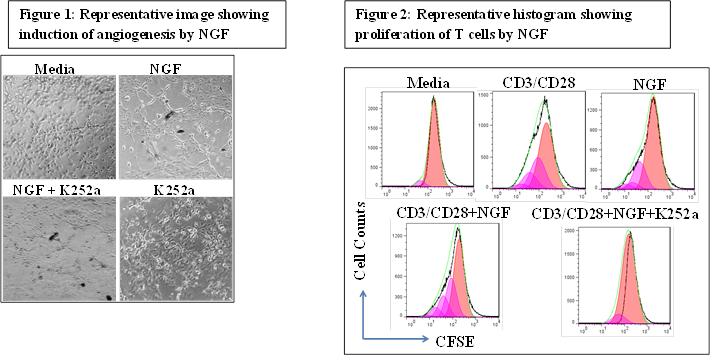Session Information
Session Type: Abstract Submissions (ACR)
Background/Purpose: Outside the nervous system, several studies have established the regulatory role of nerve growth factor (NGF) and its high affinity receptor, TrkA. A clinical trial showed that NGF monoclonal antibody reduced osteoarthritic pain. We have reported regulatory role of NGF/TrkA in chronic inflammatory diseases, e.g., psoriasis, psoriatic arthritis (PsA) and rheumatoid arthritis (RA). These observations suggest the functional significance of NGF and its high affinity receptor, TrkA in pain and inflammation. We are reporting the role of NGF and TrkA on two key pathological events of inflammatory cascade: angiogenesis and T cell proliferation.
Methods: Human dermal microvascular endothelial cells (HDMEC) tubule formation (angiogenesis) was assessed using bovine type I collagen. HDMECs (40000 cells/ml) were incubated in presence or absence of NGF, K252a for 6 hours at 37oC. Tubule formation was checked under microscope (20x). Magnetically sorted CD3+T cells from psoriasis, PsA and RA were stimulated with CD3/CD28 cocktail and cultured in presence or absence of NGF, TrkA inhibitor K252a. Cell proliferation was measured by MTT and CFSE dilution assay
Results: Angiogenesis was markedly increased with NGF (68.39±2.10%) compared to media (15.57±0.80%, p<0.001). K252a (20.42±0.98%) significantly inhibited NGF induced angiogenesis (68.39±2.10%, p<0.001) (Figure 1). CD3+T cells proliferation was significantly increased by NGF (OD: 1.2±0.09) compared to media (OD: 0.73±0.07, p<0.05). In presence of physiological stimulus (CD3/CD28), NGF induced more proliferation (OD: 2.17±0.23) of CD3+T cells compared to only physiological stimulus (1.62±0.23, p<0.01). Potent TrkA inhibitor, K252a significantly blocked the NGF induced CD3+T cells proliferation (1.33±0.16 vs. 2.17±0.23, p<0.01). Similar results were observed in CFSE assay too (Figure 2).
Conclusion: This study suggests the regulatory role of NGF/TrkA interaction on two major events of inflammatory cascade: angiogenesis and T cell proliferation. Thus inhibition of NGF/TrkA interaction either by NGF monoclonal antibody or TrkA inhibitor could be a new therapeutic approach for chronic inflammatory diseases.
Disclosure:
S. P. Raychaudhuri,
None;
A. Datta Mitra,
None;
S. K. Raychaudhuri,
None.
« Back to 2012 ACR/ARHP Annual Meeting
ACR Meeting Abstracts - https://acrabstracts.org/abstract/ngf-and-trka-a-novel-therapeutic-target-in-chronic-inflammation/

